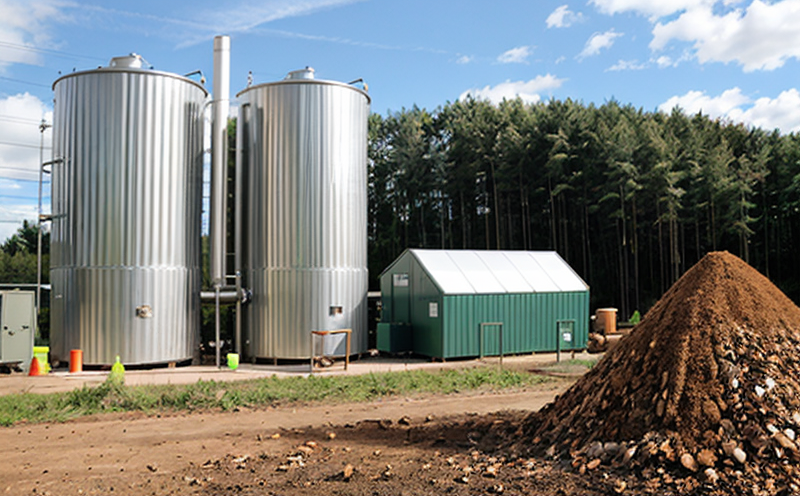ISO 16994 Total Sulfur and Chlorine Content in Biomass Fuels
The ISO 16994 standard is a critical tool for quality managers, compliance officers, R&D engineers, and procurement professionals working with biomass fuels. This test determines the total sulfur and chlorine content present in these fuels, which are essential for optimizing their use in waste-to-energy conversion processes. By ensuring that the levels of sulfur and chlorine meet regulatory standards, this test enhances environmental sustainability and operational efficiency.
Biomass fuels derived from organic materials such as wood chips, agricultural residues, and municipal solid waste undergo various processing stages before being used in energy conversion plants. The presence of sulfur (S) and chlorine (Cl) can significantly impact the combustion process, leading to formation of pollutants like sulfur dioxide (SO₂) and chlorinated compounds during incineration.
These elements not only affect air quality but also influence fuel performance characteristics such as ash formation and corrosion resistance. Therefore, accurate measurement of total sulfur and chlorine content ensures that biomass fuels are suitable for energy conversion without compromising on environmental or operational standards.
The ISO 16994 test method involves sample preparation where the biomass fuel samples are homogenized to ensure representative analysis. The prepared samples undergo combustion analysis using specialized instruments capable of measuring trace amounts of sulfur and chlorine accurately down to parts per million (ppm).
This testing procedure provides valuable insights into the composition of biomass fuels, allowing stakeholders involved in waste management and recycling industries to make informed decisions regarding fuel selection and process optimization.
| Sample Preparation | Combustion Analysis | Data Analysis |
|---|---|---|
| Homogenization of biomass samples | Combustion at high temperatures | Analyzing residual ash for sulfur and chlorine content |
The results generated by this testing procedure are crucial for several reasons:
- Regulatory Compliance: Ensures that the biomass fuels meet national and international standards.
- Emissions Control: Helps in minimizing emissions of harmful pollutants during combustion processes.
- Fuel Quality Assurance: Provides data on fuel consistency, which is vital for reliable operation of energy conversion facilities.
In conclusion, the ISO 16994 test plays a pivotal role in maintaining high standards within waste management and recycling sectors by providing accurate measurements of total sulfur and chlorine content. This information supports better decision-making processes related to fuel selection, process optimization, and overall sustainability efforts.
Benefits
The ISO 16994 Total Sulfur and Chlorine Content in Biomass Fuels test offers numerous benefits that are particularly relevant for waste management and recycling industries:
- Enhanced Environmental Sustainability: By reducing sulfur and chlorine emissions, this test contributes to cleaner air and reduced environmental impact.
- Informed Decision-Making: Accurate data helps stakeholders choose the most appropriate biomass fuels for their specific needs.
- Operational Efficiency: Ensures that fuel quality remains consistent throughout its lifecycle, leading to more efficient operations.
- Compliance Assurance: Guarantees adherence to local and international regulations governing waste management practices.
These benefits collectively contribute towards creating a more sustainable future by optimizing resource use while minimizing negative effects on the environment.
Industry Applications
| Application Area | Description |
|---|---|
| Energy Conversion Plants | Ensures that biomass fuels meet stringent emission control requirements. |
| Biofuel Production Facilities | Helps in selecting suitable raw materials for biofuel production processes. |
| Municipal Solid Waste Management | Serves as a critical tool for managing waste-to-energy conversion projects effectively. |
The ISO 16994 test finds application across various sectors, including energy generation from renewable sources like biomass. Its primary purpose is to provide reliable data on the sulfur and chlorine content in biomass fuels, which are key factors influencing combustion efficiency and emissions levels.
In addition to these applications, this test also plays a significant role in research and development activities aimed at improving the quality of biomass fuels. By providing precise measurements, it supports continuous improvement initiatives that aim to enhance fuel performance parameters while ensuring compliance with relevant standards.
Why Choose This Test
The ISO 16994 Total Sulfur and Chlorine Content in Biomass Fuels test is essential for several reasons:
- Regulatory Compliance: Ensures that all processes adhere to local and international regulations.
- Sustainability: Promotes the use of environmentally friendly fuels by minimizing harmful emissions.
- Efficiency: Enhances operational efficiency through consistent fuel quality assurance.
- Quality Assurance: Provides accurate data that supports informed decision-making throughout the supply chain.
The test is particularly beneficial for industries involved in waste management and recycling, where the correct handling of biomass fuels can significantly impact environmental outcomes. By choosing this test, organizations demonstrate their commitment to sustainability and compliance.





